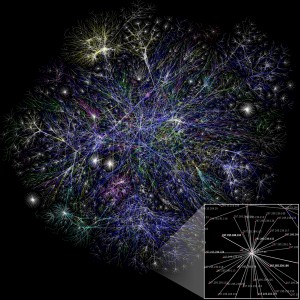SOAComm: 1st International Workshop on Self Organized Adaptive Communications

- Background and Goals
- Topics of Interests
- Chairs
- Program Committees
- Instructions of Authors
- Important Dates
- Paper Submission
- Contact Us
Adaptive configuration of mobile communication networks
Self organization in IoT and M2M communications
Self organization concepts for efficient ad-hoc networking
Self organization in vehicular communications & networks
Adaptive and self-organized sensor networks
Self organization in Cognitive Radios Networking
Machine learning for communications
Self-organization for network optimization and management
Self-organization and network reliability, QoS, QoE
Self organization for enhancing energy efficiency in communication networks
Adaptive resource allocation in communication networks
Performance evaluation of self organization concepts in multi-system, multi-vendor communication environments
SON test-beds and experimental results
Self organization for ubiquitous service provision over complex networking infrastructures
People-centric networking
Participatory sensing / mobile crowdsensing systems
Self organization standards and protocols
Malamati Louta, Asssoc. Prof, Department of Informatics and Telecommunications Engineering, University of Western Macedonia, louta@uowm.gr, GREECE
George T. Karetsos, Professor, Department of Computer Engineering, Technology Education Institute of Thessaly, karetsos@teilar.gr, GREECE
Thomas Lagkas, Lecturer, The University of Sheffield, E-mail: tlagkas@city.academic.gr
Albena Mihovska, University of Aalborg, Denmark
Stefan Mangold, Lovefield Wireless GmbH, Switzerland
Stefan Fischer, University of Lübeck, Germany
Fotis Foukalas, Qatar University, Qatar
Angelos Rouskas, University of Piraeus, Greece
Panagiotis Demestichas, University of Piraeus, Greece
Steven Latré, University of Antwerp, Belgium
Paolo Bellavista, University of Bologna, Italy
Fabrizio Granelli, University of Trento, Italy
Athanasios Panagopoulos, National Technical University of Athens, Greece
You are kindly requested to address the following issues immediately,
as IEEE may be slow in responding to help requests.
Important Notice for Authors of Accepted Papers:
All Accepted Papers are required to pass IEEE PDF eXpress PDF Check by JULY 20, 2016 (Firm Deadline) in order to be included in the IEEE Xplore-compliant CD
–
Step by Step Instructions:
Access the IEEE PDF eXpress site at http://www.pdf-express.org (open June 23, 2016)
- First-time users: Click “New Users-Click Here”, enter 39952X for the Conference ID, your e-mail address and choose a new password. Continue to enter information as prompted. Check that the contact information is still valid and click Submit.
- Previous users, but using it the first time for a new conference: Enter 39952X for the Conference ID, your e-mail address and the password you used for your old account. When you click “Login”, you will receive a warning saying you need to set up an account. Simply click “Continue”. Enter your previously used e-mail address and password combination to enable your old account access the IISA2016 conference.
- Returning users: Enter 39952X for the Conference ID, e-mail address and password.
- For each conference paper, click “Create New Title”
- Enter identifying text for the paper (title is recommended but not required)
- Click “Submit PDF for Checking” or “Submit Source Files for Conversion”
- Indicate Platform, source file type (if applicable), click Browse and navigate to file, and click “Upload File”. You will receive online and e-mail confirmation of successful upload
- You will receive an e-mail with your Checked PDF or IEEE PDF eXpress-converted PDF attached. If you submitted a PDF for Checking, the email will show you if your file passed or failed.
–
AFTER you have successfully created the IEEE Xplore-compatible PDF file(s) you must re-upload the Final Camera-Ready file using Easychair Paper Submission System by JULY 20, 2016 (Firm Deadline)!
–
Troubleshooting:
If the PDF submitted failes the PDF check:
Option 1: Submit your source file for conversion by clicking Try again, then Submit Source Files for Conversion.
Option 2: Read the PDF Check report, then click “The PDF Check Report” in the sidebar to get information on possible solutions.
Option 3: “Request Technical Help” through your account or via email at: pdfsupport@ieee.org (include Conference id: 39952X).
If you are not satisfied with the IEEE PDF eXpress-converted PDF:
Option 1: Resubmit your source file with corrections Try again, then Submit Source Files for Conversion.
Option 2: Submit a PDF by clicking Try again, then Submit PDF for Checking
Option 3: “Request a Manual Conversion” through you account
Paper Submission Process
Note! During paper submission, when you reach the SELECT A TRACK page, if you are submitting a paper to a Workshop or Special Session, you are kindly requested to select the appropriate WS (Workshop Session) or SS (Special Session) from those listed on the paper submission form. Otherwise, please select GS (General Sessions)!
To Submit, Edit or Review a Paper, please sign in using the link below
If you don’t have an Account please create one Here
If you are having any trouble with your account please click here
Malamati Louta, louta@uowm.gr
George T. Karetsos, karetsos@teilar.gr


